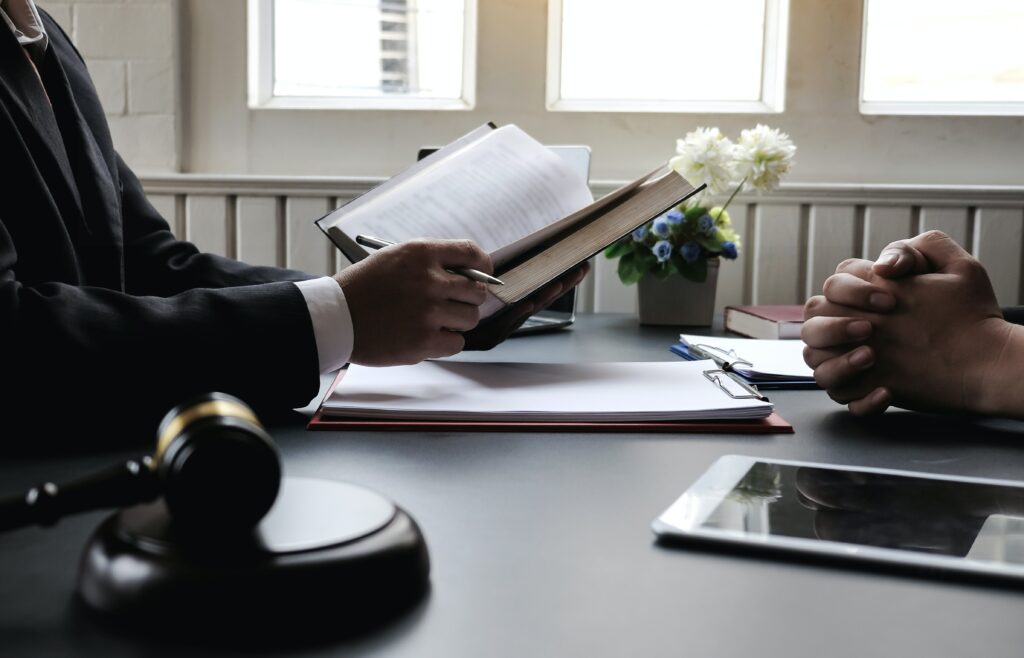Depositions are a crucial part of the discovery process in civil and criminal litigation.
I always tell my clients that their deposition is the most important day of their case. The deposition can make or break a case.
A deposition is a pre-trial legal procedure in which a witness or party in a case provides sworn testimony outside the courtroom. This testimony is taken under oath and recorded verbatim by a court reporter.

Why Do Lawyers Take Depositions?
I tell my clients that there are four (4) main reasons why lawyers take depositions:
1. Gathering Information
The first reason why lawyers take depositions is to gather as much information as possible. Ethical rules prohibit a lawyer from communicating directly with another attorney’s client without the consent of that party’s lawyer.
Since lawyers cannot talk to the other party without their attorney present, each State has created rules that allow the attorney to perform “discovery” to learn about the facts of the case.
As part of the discovery process, depositions provide a formal setting where a lawyer can question the opposing party’s client and other witnesses under oath.
Both parties’ lawyers are present, and the questioning occurs in a controlled, structured environment.
Since a lawyer typically has only one opportunity to take a deposition, they usually approach it with careful preparation and aim to ask thorough and precise questions. It is not uncommon for a party deposition to take a full day and, sometimes, multiple days to finish.
The deposition allows the attorneys for both sides to question witnesses under oath. This process helps uncover facts, gather evidence, and understand the opposing party’s arguments and evidence.
2. Preserving and Pinning Down Testimony
The second reason lawyers take depositions is to preserve and “pin down” testimony. A deposition serves the dual purpose of not only recording evidence but also “pinning it down” so the story doesn’t change at trial.
By creating a precise record of what was said, a deposition effectively “pins down” a witness’s story.
If the witness later changes their testimony at trial, the opposing party can use the deposition transcript to demonstrate the inconsistency.
By locking in the testimony of witnesses before trial, depositions help prevent unexpected changes or surprises during the trial.
3. Impeachment of Witnesses
The third reason a lawyer takes a deposition is to use it as an impeachment tool if the person’s testimony changes at trial.
If a witness’s testimony at trial contradicts their statements made during a deposition, the deposition transcript can be used to impeach the witness’s credibility.
Here’s how it works:
- Identifying the Inconsistency: The attorney would first identify the specific statements that are inconsistent between the deposition and the trial testimony.
- Presenting the Deposition Transcript: The attorney will then present the portion of the deposition transcript that contains the inconsistent statement to the witness, asking them to acknowledge their earlier testimony.
- Questioning the Witness: The attorney will then question the witness about the inconsistency to show the judge or jury that the witness has changed their story. This should not happen since the client was under oath on both occasions. This can put the witness on the defensive and cause the jury or judge to question their reliability.
- Arguing the Inconsistency: Finally, in closing arguments or other means, the attorney will argue that the inconsistency is a reason to doubt the witness’s overall credibility or the truth of their testimony.
This can be a powerful tool for undermining the opposing party’s case.
4. Assessing Witness Credibility
The fourth reason a lawyer takes a deposition is to evaluate the witness’s credibility.
Attorneys use depositions to evaluate their clients and other witnesses to see how they might perform at trial, including assessing whether they will be perceived as credible, likable, and effective in presenting their testimony.
Here’s how this evaluation process typically works:
- Assessing Demeanor and Communication Skills: During a deposition, an attorney can observe how a client or witness answers questions, including their tone, body language, responsiveness, and clarity of expression. This helps in assessing how a jury or judge might perceive them.
- Identifying Strengths and Weaknesses: A deposition allows an attorney to see how a witness responds to both friendly and adversarial questioning. They can identify areas where the witness is strong and confident and where they may be vulnerable to attack or contradiction.
- Testing Credibility: How a witness answers questions, their consistency in responses, and their overall comportment can provide insight into how credible they will appear. Contradictions or hesitations may signal potential credibility issues that must be addressed before trial.
- Evaluating Likability: The deposition process provides a glimpse into how a witness might connect with a jury. Factors such as politeness, humility, confidence without arrogance, and the ability to explain complex matters simply can contribute to a witness being likable and persuasive.

How Far Can a Lawyer Go In Asking Questions at a Deposition? Is Everything Fair Game?
In a deposition, a lawyer’s ability to ask questions is broad, but it is not without limits. The rules governing depositions will vary from State to State, but generally, there are some common principles and restrictions:
1. Scope of Deposition Questions
Generally, questions in a deposition must be related to the lawsuit’s subject matter and “reasonably calculated to lead to the discovery of admissible evidence.”
The concept that questions must be “reasonably calculated to lead to the discovery of admissible evidence” means that the questions don’t have to be directly related to admissible evidence themselves.
Instead, they must be likely to uncover information that could, in turn, lead to or relate to evidence that could be used at trial.
It allows for a broader scope of inquiry than what might be permitted in the actual trial, recognizing that the discovery process is a time for parties to investigate and gather information related to their case.
2. Relevance
While the standard for relevance in a deposition is typically broader than at trial, questions still must have some bearing on the claims or defenses in the case.
Fishing expeditions or questions designed merely to harass or embarrass the witness will be considered out of bounds, and your lawyer will likely instruct you not to answer the question.
3. Privilege
Questions that probe into areas protected by legal privilege (such as attorney-client communications) can be objected to and are generally off-limits.
Your lawyer will likely instruct you not to answer any question that seeks privileged information.
4. Harassment or Oppression
A lawyer cannot ask questions in a manner that harasses or oppresses the witness. This includes overly aggressive questioning, repetitive questions designed to badger the witness, or questions intended to embarrass the witness without any legitimate connection to the case.
5. Objections
An attorney can object to questions during the deposition. Common objections include relevance, privilege, form of the question, or that the question is argumentative.
While in most jurisdictions, the deposition will continue, and the question will be answered despite the objection, the record will reflect the objection, and a court may later rule on whether the question and answer can be used.
What Does it Mean That a Deposition is Under Oath and Recorded Verbatim? (Why This is So Important To Understand)
When a deposition is said to be “under oath” and “recorded verbatim,” it refers to two critical aspects of the deposition process that lend it gravity and legal significance:
1. Under Oath
When a witness gives a deposition, they are required to swear an oath to tell the truth, identical to the oath taken by witnesses at a trial.
This means that the witness is legally obligated to provide honest and accurate answers to the questions posed.
2. Recorded Verbatim
A deposition is recorded “verbatim,” which means that every word spoken by the witness, the attorneys, and anyone else present is precisely recorded, either through a written transcript, audio recording, or video recording.
A court reporter is present to create a written record of the deposition, capturing every word exactly as it is spoken.
The verbatim transcript ensures the record is accurate and complete, leaving no room for interpretation or ambiguity.
The deposition transcript is typed into a book. It can be used later in court if there is a need to reference what was said during the deposition or if the deposition itself is introduced as evidence.
These two aspects of a deposition underscore the process’s seriousness and formality.
Being under oath obliges the witness to be truthful, while the verbatim recording ensures that the testimony is captured precisely as it was given.
This combination provides a valuable tool for the lawyers to gather reliable information, hold witnesses accountable for their statements, and ensure that the record is clear and unequivocal.
Frequently Asked Questions (FAQs)
Q. Is a Deposition Under Oath?
Yes, a deposition is conducted under oath. When a person is sworn in before giving their deposition testimony, they promise to tell the truth, the whole truth, and nothing but the truth. This oath is a solemn commitment to provide accurate and honest information during the deposition.
Being under oath means that the person being deposed is legally obligated to be truthful and not to provide false or misleading information. If they intentionally lie or withhold important information during the deposition, they could be held accountable for perjury, which is a criminal offense.
Q: Are depositions open to the public?
No, depositions are typically private proceedings accessible only to the parties involved, their attorneys, the witness, the court reporter, and, if necessary, expert witnesses.
Q: Can a witness refuse to answer questions during a deposition?
In some instances, a witness may assert their Fifth Amendment right against self-incrimination and refuse to answer specific questions. Otherwise, witnesses are generally required to answer relevant questions truthfully.
Q: Can a deposition be used in other legal proceedings?
Yes, deposition transcripts can be used in other legal proceedings as long as the same issues are involved and the parties had the opportunity to participate in the original deposition.
Q: Is coaching a witness before a deposition legal?
While attorneys can prepare their witnesses for a deposition, they cannot instruct them to provide false or misleading information.
A good attorney will coach their client and prepare them well for the deposition.
Conclusion
In conclusion, depositions are a fundamental aspect of the legal process, serving as an essential tool for gathering information, assessing witness credibility, and aiding in settlement negotiations.

